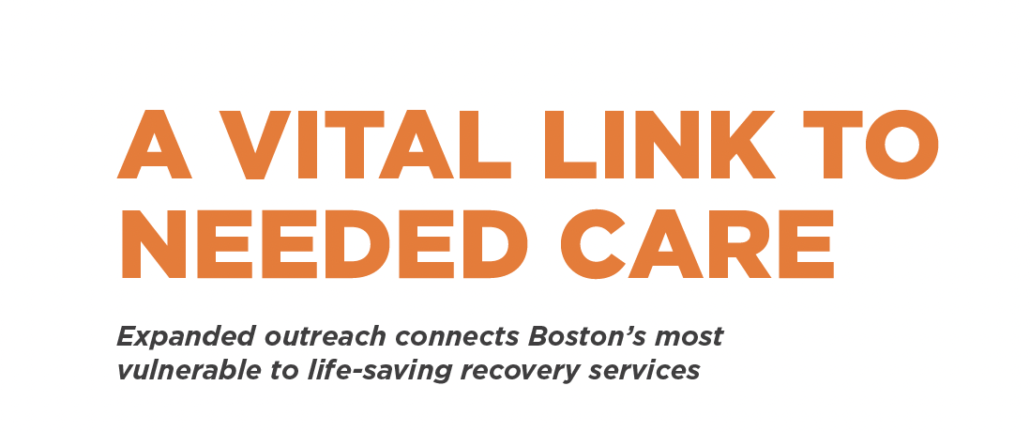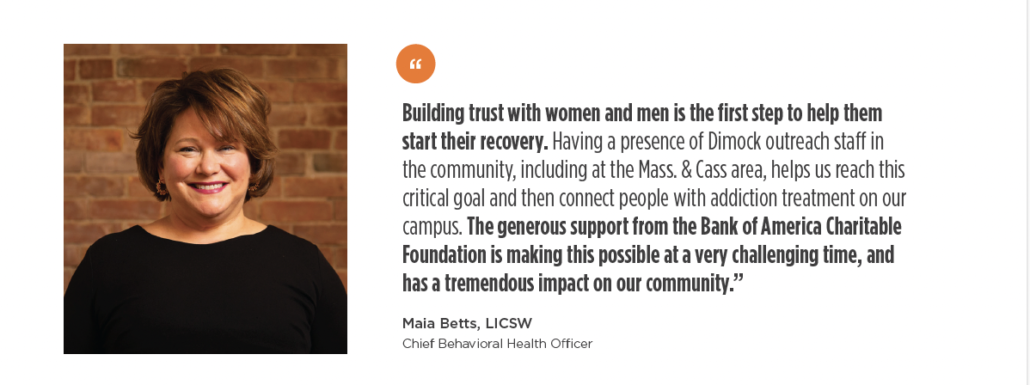
The intersection of Massachusetts Avenue and Melnea Cass Boulevard (“Mass. and Cass”) in Boston’s South End is a hub of substance use recovery services. Unfortunately, as the COVID-19 pandemic has compounded the severity of the opioid use epidemic, the area also became a site for encampments constructed by those facing housing insecurity, many of whom are also struggling with substance use disorder.
“This is beyond a public health crisis, this is a human suffering crisis,” Dimock President & CEO Dr. Charles Anderson told GBH Greater Boston’s Jim Braude. Though the tents were cleared in early 2022, Dr. Anderson says, “It’s going to be hard for us to forget these images that we saw there on Mass. and Cass.”
Recognizing the enormous need to connect former residents of Mass. and Cass with substance use treatment, Dimock plans to expand its outreach efforts, thanks to a generous grant from the Bank of America Charitable Foundation. The grant will fund a full-time Acute Treatment Services Admissions Navigator, who will provide outreach and transportation for patients to get to our Acute Treatment Services unit for medically-assisted treatment. From there, clients will be connected with Dimock’s entire continuum of care.
“At Bank of America, we believe we have the unique opportunity to help address some of society’s biggest challenges. Through our partnership with The Dimock Center, we are helping to alleviate the physical and mental health impacts of the pandemic by connecting the most vulnerable in our community with the health care services they need,” said Miceal Chamberlain, President, Bank of America Massachusetts.

Andrew Mrozinski, a resident of Dimock’s Askia Academy since June 2021, often uses his weekend passes to provide essential items (such as socks, underwear, and NARCAN®) to high-volume areas like Mass. and Cass and the Boston Common, where he says many of Boston’s homeless have moved.
“There’s such a need for an outreach program like this,” he says. “A lot of people look at this like it’s a problem to be solved. It’s not a problem to be solved. It’s people to be helped.”
Andrew, who is currently enrolled in classes, hopes to continue this work as a Recovery Specialist after completing his program. “There’s an exponential need for this kind of help,” he says. “I think it’s going to have to be a multi-faceted approach. Many have mental health needs that should be addressed. For others, housing is most critical. Substance use treatment needs to be offered, too. I’m tired of losing friends. I’m tired of losing the people I care about.”
Matt Raspanti, LMHC, who is the Clinical Director at Askia Academy, says there was a large spike in requests for beds when the tents at Mass. and Cass were removed and demand for services increased.
“I think it is really important that Dimock has a presence at Mass. and Cass. And if it’s not Mass. and Cass, we’ll always be able to identify places with this great need.”
“For someone to change their habits around substance use and address their own mental health and trauma—those are really tough things. We have to show that this is a safe, welcoming, and supportive environment,” he says.
Opioid use disorder has become especially deadly for Black men, with death rates in Massachusetts rising 69% in 2020.
“This is a historically Black neighborhood and treatment center,” Matt Raspanti says.
“Recognizing this history and continuing to learn from other organizations, learn from people in the community, learn from those who lived at Mass. and Cass and those who need treatment right now, is critical.”
Despite the significant challenges facing our community, Dr. Anderson maintains that we have much reason to feel hopeful about the impact our work will have. “I have never seen this type of organized effort coming from this place of real sincerity. . . .How can you not feel hopeful?”

